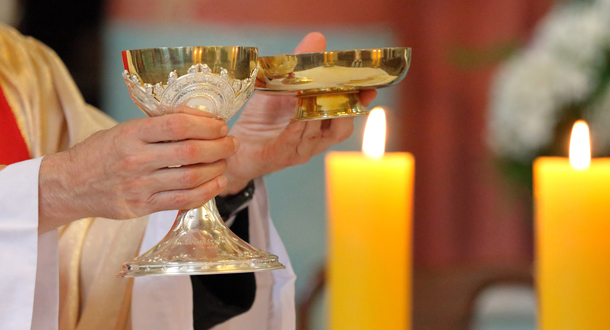
The Most Holy Body and Blood of Christ
Scripture:
Genesis 14:18-20
1 Corinthians 11:23-26
Luke 9:11b-17
Reflection:
This Sunday in the Church calendar is the Solemnity of the Body and Blood of Christ, when we reflect on Jesus’ sacrifice and the sacrament in which we participate in the sacrifice, the Eucharist. This year, the day on which the Church celebrates this feast is also when people in the U.S. celebrate Father’s Day, and it also marks Juneteenth, June 19th, when, in 1865, at the end of the Civil War, slaves in Texas were notified, quite some time after the Emancipation Proclamation, that they were actually free.
The Solemnity of the Body and Blood of Christ is important to us as a church. In a famous phrase from the Second Vatican Council, the Eucharist is the “source and summit” of our lives as Christians. It is the source of our lives because we are fed with the gift of Jesus’ entire self, His Body and Blood poured out for us. It is the summit because it signifies an intimate connection with Jesus, which we hope to have forever in heaven.
In the celebration of the Mass, we come together as a community of faith, to give thanks and praise to the God who loves us. We come to hear God’s word, and we come to share in the sacrifice Jesus made once for all, which is made present for us. We partake of the bread and wine which we believe becomes the Body and Blood of Christ poured out for us (See our second reading: 1 Corinthians 11:23-26). We receive Jesus into ourselves in a most intimate way.
To receive this gift of Jesus, given out of love for us, demands a response. And the response is to give of ourselves, to God and to the world. How do we do that? I think we can find answers in both our Scripture readings and in the days our society celebrates.
One way we give of ourselves is to share the blessings we have received. In our first reading from Genesis (14:18-20), Abram has returned victorious over the forces who took his kinsman Lot into captivity. Melchizedek, king of Salem, and a priest, blesses God and invokes God’s blessing upon Abram, and then “Abram gave him a tenth of everything.” In our Gospel reading (Luke 9:11b-17), Jesus multiplies the loaves and the fish, and gives the food to the disciples to give to the people. We are to give what we have been given.
As we celebrate Father’s Day, we can reflect on our call to give of ourselves as a loving father gives of himself to his spouse and to his children. We know the sacrifices parents make for their children, and in response to Jesus’ sacrifice for us, we are called to make sacrifices for others.
As we celebrate Juneteenth, we are reminded of another aspect to our celebration of the Eucharist. Our celebration of the Eucharist has a connection with the Jewish celebration of Passover. When the Jewish people celebrate Passover, they are not simply remembering something that happened thousands of years ago. They believe that the liberating act of God which brought them out of slavery in Egypt is made present for them. In the same way, when we celebrate the Eucharist, we are not remembering or re-enacting something that happened thousands of years ago. We believe that the liberating act of Jesus, which freed us from slavey to sin and the fear of death, is made present for us.
So perhaps we can see our response to Jesus as helping to free others. In working for justice and peace, we help people be free of injustice and oppression. In reaching out to others in their need, we help people be free from poverty and lack of the necessities of life. We help people be free from addiction by helping them turn to a loving Higher Power. We can help free people from despair by caring for them and sharing the hope we have in the Resurrection of Jesus.
There are many ways to respond to the gift of Jesus’ self, poured out for us. But we are called to respond. As we take Jesus into ourselves at the Eucharist, may we share the gift we have been given by giving of ourselves.
Fr. Phil Paxton, C.P., is the local superior of the Passionist Community in Birmingham, Alabama.
